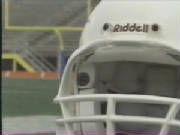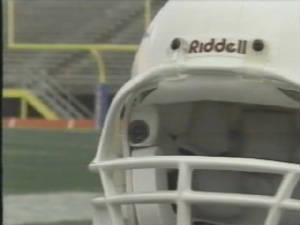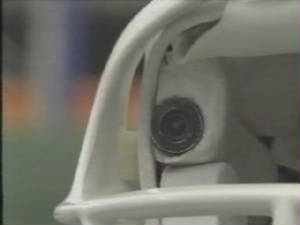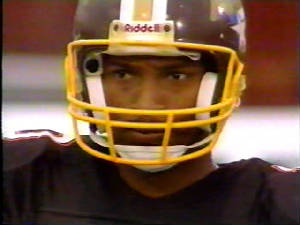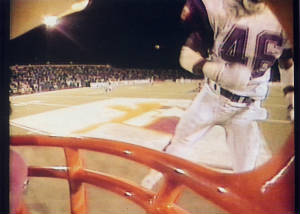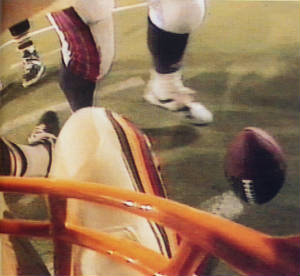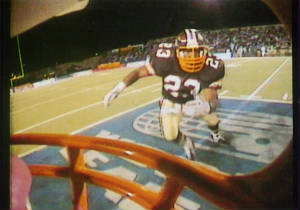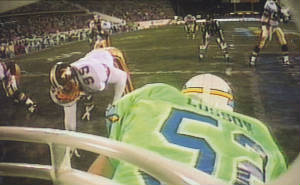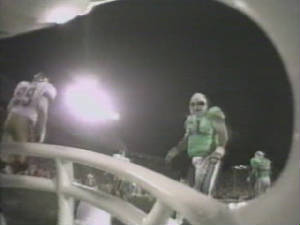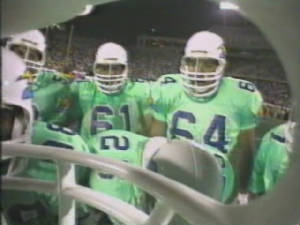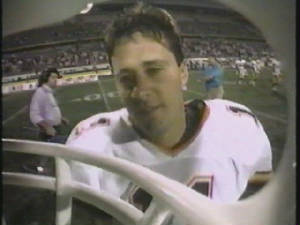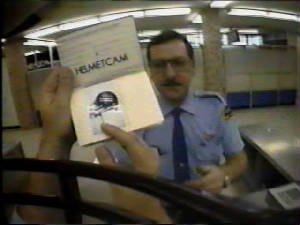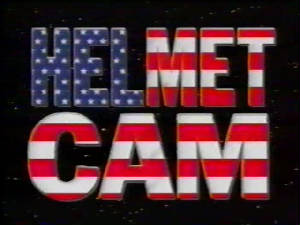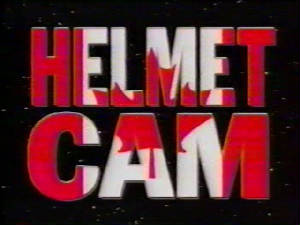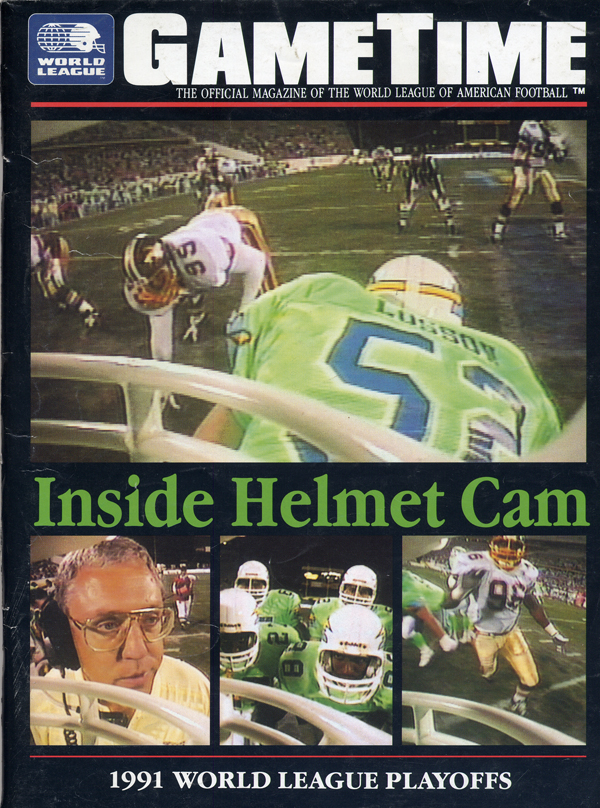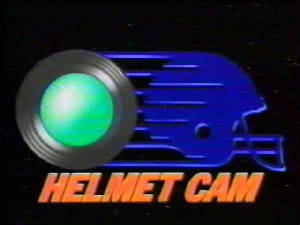
So what was the Helmet-Cam? Helmet-Cam is
short for helmet camera which was developed by USA Network and AVS: Aerial Video Systems of Burbank, CA. The camera
was placed over the right ear of the player in the VSR-3 Riddell helmet. An antenna was placed in the crown of the helmet
between an inflatable pad and the shell. The Helmet Cam is on at all times, bouncing its signal off a microwave dish
in the stadium to the production truck. Each one of these Helmet-Cams cost $20,000! Nelson Kraemer, an engineer
from Riddell, sent a letter to Mr. Jack Coffee about the progress of the Helmet-Cam testing on their helmets on March 20,
1991. In this letter he stated information about the Helmet-Cam and its dimensions. He states that he had a hard
time putting the helmet on a test dummy which he feels is the reason that the severity index (which I assume rates the injury
level when wearing this helmet) was higher than usual. This must be because the padding would give way in a collision
but not the camera even though it was covered with a small amount of padding itself.
This new innovation made it possible for the viewer to see what the player sees through the player's eyes.
Sometimes the video would cut out and it could really make you sick if you watched it constantly but it was really cool. One
of the best lines about the Helmet-Cam came from a broadcast of a game where we see the player get hit through the camera
and then it topples end over end. The commentator (was it Boomer?), said, "I hope his head wasn't in there!"
An equipment manager for one of the teams told me that the Helmet-Cam was not
easy to work with. The cable ran from the helmet to the player's jersey in their back. So when the player came
off the field, someone would have to hold the helmet when the the player took it off his head.
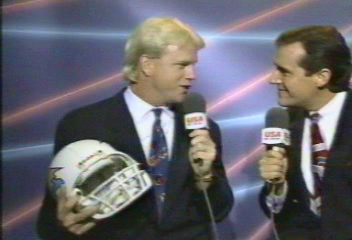
|
| 1st Introduction on March 25, 1991 Orlando vs. San Antonio |
Helmet-Cam Dimensions
Camera size - 9/16" diameter x 2" long
Antenna size - approx. 1/8" - 3/16" thick x 3" x 3"
A two-pound battery pack and transmitter is molded into the
quarterback`s shoulder pads
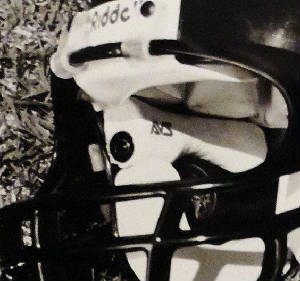
|
| AVS Helmet-Cam in WLAF Promo Helmet and AVS Logo |
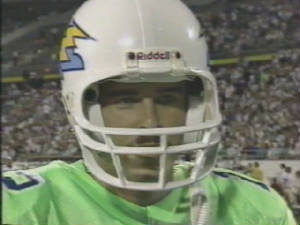
|
| Kerwin Bell was the first player to wear the Helmet-Cam (over right eye) |
|
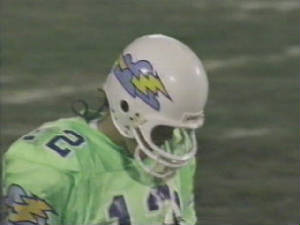
|
| Antenna cable visible out of Bell's helmet in back |
|
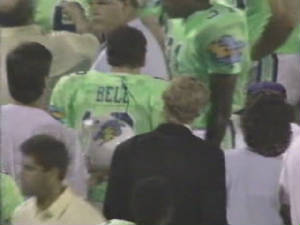
|
| When helmet was off, someone else had to carry it for Bell |
|
|
|
|
|
USA Network Helmet-Cam Promos
USA Network Helmet-Cam Appearances
1991
(in
order of appearance)
QB Kerwin Bell, Orlando vs.
San Antonio (3/25/91)
QB Lee Saltz, San Antonio
vs. Frankfurt (4/1/91)
LB Tracy Simien, Montreal
vs. Birmingham (4/8/91)
QB Stan Gelbaugh, London
at Birmingham (4/15/91)
QB Jeff Graham and LB
Ron Sancho, NY/NJ vs. Sacramento (4/22/91)
LB
Paul McGowan and QB Brent Pease, Birmingham vs. San Antonio (4/29/91)
LB David Bailey and RB Ricky Blake, San Antonio vs. London (5/6/91)
NT Roy Hart, London at NY/NJ (5/11/91)
CB Richard Shelton, Montreal vs. Raleigh-Durham (5/13/91)
LB Danny Lockett, London at Sacramento (5/18/91)
QB Eric Jones and LB Paul McGowan, Birmingham vs. NY/NJ (5/20/91)
S Anthony Cooney, San Antonio at NY/NJ (5/25/91)
FB Broderick Sargeant and LB Tracy Simien, Montreal vs. Orlando (5/27/91)
TE Demetrius Davis (Barcelona) and QB Eric Jones (Birmingham), Barcelona
at Birmingham (6/1/91) Playoff
1992
Newspaper Helmet-Cam Articles
Wlaf Will Use Innovations To Attract Tv Viewers
Sunday Special - World League of American Football
March 24, 1991|By
Nancy Gay of The Sentinel Staff
Television contracts and sports never have been mutually
exclusive, so naturally the first thing the World League of American Football - the quintessential made-for-television league
- did to ensure its survival was line up the networks.
As surprising as it may seem, two of them
jumped at the opportunity - USA Network and ABC Sports, which paid a combined $48 million to broadcast three WLAF games every
week.
USA Network, which has a 4-year, $18 million package with the league, will telecast all
Saturday games, a Monday night ''Game of the Week'' and six ''European Specials'' for Saturday viewing in the United States.
ABC Sports has a 2-year,
$30 million deal to televise Sunday games and all three postseason games.
Canada's TSN Cable will show WLAF games, and European networks, such as British
Sky Broadcasting's Eurosport and Spain's TV 3 Catalunya, also have signed multiyear deals with the league.
Industry insiders say ABC Sports, along with NBC Sports, approached the NFL with the idea of a spring league because,
as Dennis Swanson, head of ABC Sports, says, ''Polls show people like to watch football on television.''
ABC says it will charge advertisers $20,000 to $25,000 per half-minute its first season.
USA
Network will use current NFL quarterbacks as color commentators. ABC will go with the team of Brent Musburger and Dick Vermeil.
''People who tune in to this obviously are hard-core fans who can't get enough. People will check it out because
they're curious,'' Musburger said. ''There are no illusions here. We're not going to walk in and beat the NCAA regional finals
or knock off the NBA playoffs.''
To attract TV viewers, the league is introducing a number of
electronic innovations, including microphones on the back judge and audio pickup of quarterbacks communicating via helmet
radios.
This one might be straight out of a James Bond flick: a miniature camera mounted on the
quarterbacks' helmets, just above the right temple, showing live game action.
Orlando Thunder
quarterback Kerwin Bell will be the first player ever to wear the tiny camera, dubbed ''Helmet-Cam'' by its inventors, Aerial
Video Systems in Burbank, Calif. He'll sport the quarter-sized device Monday night when the Thunder play the San Antonio Riders
at the Florida Citrus Bowl.
Helmet-cam Has Bugs To Iron Out
March 26, 1991|By
Jerry Greene of The Sentinel Staff
The helmet-camera was introduced to football telecast-ing by Orlando
Thunder quarterback Kerwin Bell. The debut was dramatic when Bell tried to scramble out of trouble and had helmet - camera
and all - knocked off his head.
USA Network viewers were treated to a dizzying view that, for an instant, gave the horrible
impression that Bell had been decapitated.
Cincinnati Bengals quarterback Boomer Esiason, serving as a network analyst,
said about the helmet-cam: ''This leaves no room for excuses when the coach asks, 'What were you looking at when you threw
the ball?
The camera is the size of a tube of lipstick and fits in a pad above
the quarterback's ear. A problem is that when Bell wiped perspiration from his eyes, he occasionally would smear the lens.
HALFTIME EXUBERANCE
RAJ BHATHAL, principal owner of the
Thunder, could not have been happier at halftime. ''I'm tickled pink,'' he said. ''What I have liked best is the enthusiasm
of the crowd. They are reacting to every play. And I'm going to tell coach (Don) Matthews that I totally approve of his game
plan to score on the opening play.'' That first-play, 75-yard touchdown pass from Bell to Eric Mitchel was the second-longest
play of the WLAF's first weekend behind a 96-yard scoring pass by the London Monarchs.
HOLE IN BLACKOUT
JERRY
VAINISI, vice president of marketing, was not pleased by reports that the USA Network telecast was being seen on cable in
Altamonte Springs, despite the league's blackout rule. Said Vainisi: ''If anyone was receiving the game in Altamonte Springs,
it was a mistake and will be corrected. We have to protect the home team with the blackout rule. Here, in Orlando, if they
began drawing more than 40,000, it might be different.'' Vainisi also said if the league learns of any bars or clubs illegally
showing blacked-out telecasts, it would take legal action immediately.
Bell Still Displays Flair For Dramatic
March 26, 1991|By Mike Dame of The Sentinel
Staff
Three years away from the spotlight did nothing to tarnish Kerwin Bell's golden-boy
image - or his uncanny flair for the dramatic.
Bell's five touchdown passes in the Orlando Thunder's victorious debut
Monday night - including a 75-yard scoring strike to open the game - cemented the former Florida star's place in local folklore.
''I
haven't felt this good since way back early in my college days,'' said Bell, who was cheered lustily as he trotted onto the
Citrus Bowl turf during player introductions.
''When I talked to coach (Don) Matthews on the sideline and told him I was going
long, he just said, 'Live on the edge.' He gave me total freedom, and it was a lot of fun out there being able to call my
own plays.''
Bell's road to what promises to be new-found
stardom - in these parts, anyway - has been a long one.
After leaving UF in 1987 as the most prolific passer in school
history, Bell spent two seasons with three NFL teams before accepting a graduate coaching position with the Gators this past
season.
That rough road must have made Monday night seem like a walk in the park. And at least one biased critic said
Bell is better for his three years in limbo.
''I think Kerwin plays much better now than he did in college,'' said Galen
Hall, Bell's head coach at UF and the Thunder's offensive coordinator. ''He's older, more mature, he's been to pro camps and
he spent a year coaching. I'm very pleased with the way he played.''
Bell, who finished with 269 yards and had scoring
passes of 75, 42, 37, 23 and 1 yard, said Hall's presence in the coaches' booth was soothing.
''I'm used to his voice,''
Bell said. ''I respond well to him, and I just thank God for putting me in this situation with Coach Hall and this great offense
and these great receivers.''
Not all of Bell's experiences Monday will be memorable. He remembers a few hits in particular,
ones captured on film by the ''helmet-cam'' that was rigged into his helmet.
''If you go back and look at the replays
with that helmet-cam, you'll see that some of those hits were pretty hard,'' Bell said. ''I was hit harder in this game than
any preseason game I ever played in the NFL.''
Nfl Won't Overlook Helmet-cam Hysteria
March 27, 1991|By Larry Guest of The Sentinel
Staff
Prediction: The helmet-cam will be in use in the NFL this fall. The new gadget, unveiled
Monday night as part of Thunder quarterback Kerwin Bell's equipment, was a hoot. The tiny device provided shots more fascinating
even than the race-cams that have removed NASCAR telecasts from the sedative list. Imagine a slo-mo of Mike Singletary bearing
down on Danny Marino's facemask. Still the unselfish country boy, Bell said he thought about ways to position his head to
provide the best shots for the fans at home. But that was when Kerwin was on the sideline. On the field, Bell said he forgot
all about the tiny camera over his right ear because he had more important shots to think about - like the ones charging linemen
were taking at his head. . . . Bell's 75-yard TD pass to Eric Mitchel on the very first play of the franchise was simply too
much for rookie pro football owner Raj Bhathal. On the sideline for the start of the game, the refreshingly exuberant Bhathal
bounded into the team bench area and began hugging coach Don Matthews. ''Not now, Raj! Not now! It's not over yet!'' exclaimed
a startled Matthews, who chuckled about the incident afterward and allowed as how it was great to have an owner who is so
enthusiastic. Before being blind-sided by his happy boss, Matthews had flashed back to a Canadian Football League playoff
game in which his quarterback fumbled on the first play, and the opposition ran in the recovery for a TD. ''We came back to
win that game, so it taught me that a first-play touchdown doesn't decide a game,'' he said.
Incidentally, that announced 21,714 at the Thunder opener was the actual turnstile count,
which didn't include a large block of discounted admissions who were routed around the turnstiles by confused ticket-takers.
Adjusted count coming from city officials today is expected to be about 24,000. . . . Good for Jack Swope, assistant GM of
the Magic, who wants to make a gesture ending the petty sniping by the Magic toward the Thunder. Swope said Tuesday he will
propose a dual-ticket promotion for Saturday soon as he can get through the jammed phone lines at Thunder offices. The Magic
play Houston at 2 p.m., and the Thunder play Raleigh-Durham at 8. If the Thunder so desire, Swope would announce to Magic
fans their ticket stubs would be good for a discount at the football game that night. Hmmmm. Does that mean a Thunder ticket
stub would be good for a discount in the O-rena April 21 when the situation is reversed - the Thunder playing Birmingham in
the afternoon and the Magic closing their season against woeful New Jersey that night?
Bell Named Player Of The Week
March 28, 1991|By Jerry Greene of The Sentinel
Staff
Wednesday was a hectic but happy day for the Orlando Thunder, who learned that quarterback
Kerwin Bell gained another line in World League history as the WLAF's first player of the week.
''This just caps a wonderful
experience,'' said Bell, who threw five touchdown passes Monday in a 35-34 victory over San Antonio. ''The most important
thing was the victory, but this award and using the helmet camera are two things I won't forget.''
While Bell and his
teammates were adjusting their short-week sights on Saturday night's game against Raleigh-Durham, Dennis Smith was busy reacquainting
himself with Orlando.
Waived in the final cut, Smith was sent to the league's ''ghost team'' in Dallas,
a group of players on call to replace injured players. The Thunder asked Smith to return after placing running back J.J. Flanigan
on three-week injured-reserve status with a pulled quadriceps.
Smith,
from the University of Utah, was a second-round draft pick of the Thunder as a tight end. However, he spent most of his practice
time as a backup fullback and special-teams player.
NOTES: The City of Orlando announced it will provide shuttle-bus
service and parking for $2 from the garage area across from the bus station on Central Avenue for all future home games. .
. . The actual attendance Monday night was 24,309, the Thunder said. City officials confirmed 21,714 as the turnstile count,
but Thunder officials said 1,463 got in on the one-cent promotion, and 1,132 servicemen and -women were admitted free. . .
.
USA Network drew a relatively low rating of 1.6 (approximately 1.4 million TV sets) for its telecast of the Thunder's
victory Monday night. However, network officials were satisfied because of competition from the Academy Awards. . . . Halftime
entertainment Saturday will be by the ever-popular Frisbee-catching dogs. No announcement yet on whether the dogs will be
wearing the helmet-cam.
If Talk Of Town Is A Gauge, Thunder's Debut Is A Hit
FROM THE CHEAP SEAT
March 29, 1991|By Bill Marx of The Sentinel Staff
How 'bout them
'ders?
One game does not a season (or lifetime) make, but you have to hand it to the Thunder: Their opening was a huge
success, even for those of us who didn't go to the game.
When CNN's sports show came on Monday night, quite a crowd
gathered around the office TV for the Thunder's highlights. There was no mistaking the enthusiasm when the video came from
Kerwin Bell's helmet-cam. Sorry about this, Kerwin, but the biggest roar came when you got clocked head-on. I think everyone
in the room jumped back.

Interesting sidelight to the helmet-cam: A reader called in Monday night to talk about rotisserie baseball, and in the middle
of our discussion, he said, ''Kerwin Bell just threw a 75-yard touchdown pass.''
''Where are you?'' I said.
''Altamonte Springs. I'm watching the game on TV.''
The
game was supposed to be blacked out locally.
Then the caller said something interesting. He said he would have gone
to the Thunder's game but wanted to watch the first one on TV so he could see the helmet-cam in action.
Settle down,
Thunder brass. The caller also said he probably would go to the team's next home game - 8 p.m. Saturday at the Florida Citrus
Bowl. (And he said this when the score was 7-0.)
THUNDER DUDS. The Thunder may be exciting, but their uniforms are ugly.
CNN's Fred Hickman called the Thunder the ''lime green Jell-O guys.'' Sportscasters on both CNN and ESPN had field days making
silly remarks about the uniforms. If there is a good side to those uniforms - and I'll admit this is a stretch - at least
people will know instantly who is playing when the Thunder are featured on TV or in highlights.
THUNDER FANS. Hats off
to the Thunder for announcing their attendance. The crowd of more than 24,000 was broken down by those who paid full price,
those who got in on the penny promotion and those who got in free. For those wondering if the Thunder's playing at the same
time as the Magic had any effect on the Magic's attendance, take note: Although the announced attendance was 15,077, the actual
attendance was 13,010, making this one of the Magic's least-attended games this season. The 15,077 figure represents tickets
sold, by the way.
It's A Cam, Cam Cam, Cam World
March 31, 1991|By Brian Schmitz of The Sentinel Staff
It could be a cam-crazy world, thanks to the World League
of American Football.
Thunder quarterback Kerwin Bell debuted the
innovative helmet-cam in a game televised last Monday night at the Citrus Bowl. The helmet-cam allowed a USA Network audience
to not only see and hear Bell at work, but feel the action. That's 2001 stuff.
You could feel Bell getting sacked, and the panic in his voice when he almost called a wrong play. My favorite moment
was the emotion captured when Bell strode to the sidelines after throwing a touchdown pass. Teammates patted him on the head,
jarring the helmet-cam and then you could see coach Don Matthews' smiling face growing larger as he congratulated Kerwin.


But I can see a version of the helmet-cam being used in other sports. How
about affixing one to a mask of a catcher? Wouldn't you want to see how fast a Nolan Ryan fastball is? Or how about eavesdropping
on the banter between batter and catcher or - better yet - players and the plate umpire?
(Woe. A network might have to start issuing a warning label before one of these games with the helmet-cam:
Some of the language you may hear on the field of play may curl your children's hair. Please use parental guidance. Actually,
some choice words already have been picked up during WLAF games.) How about affixing some kind of miniature cam on a jockey's
cap? Watching him steer a thoroughbred through a gaggle of horses could be intriguing. How about a goalie-cam for a hockey
goalie or soccer goalie?
Gee. Pretty soon TV technology is going
to get to the point where you might not even need to go to the site. I think all Bucs' fans should push hard for the helmet-cam.
Matthews gave Thunder fans little time to wonder if Saturday night's game was going
to be as intriguing as the opener. He called for an onside kick on the opening kickoff - and the Thunder recovered it against
the Raleigh-Durham Skyhawks. First play featured two offensive linemen split out with Eric Mitchel lined up behind them. It's
going to be fun, all right.
Helmet Cam, Live Mike Are Great Innovations
April 14, 1991|By Don Pierson, Chicago Tribune
The helmet cam is making the World League of American Football. The open mike is shaking it.
The
small television camera inserted into the helmets of quarterbacks is providing scenes never before viewed by the public. The
open mike on coaches is providing obscenities never before heard outside of R-rated programming.
The helmet cam is the
quarterback's best friend. After seeing what quarterbacks see (and can't see), fans never should boo them again. The combination
of speed, confusion and violence that makes football football is captured for the first time in perfect focus with the fish-eye
lens of a camera the size of a tube of lipstick.


The live mike can be television's worst enemy. ABC's Brent Musburger spent Easter Sunday apologizing for the adjectives,
verbs, and nouns - usually the same word - that kept popping up in the coaches' reactions to the heat of battle. Talk about
color commentators. It was the kind of language that makes football football, but if you missed it, it might be too late to
tune in now. WLAF President Mike Lynn and the networks are planning to tone it down.
''We would prefer a delay,'' Lynn
said.
The networks say a delay in the audio is not feasible, but they promise to be more judicious, turning the volume
up before plays and down after, concentrating on the optimism of anticipation rather than the inevitable disappointment.
Neither
the WLAF nor the networks said they were flooded by callers complaining about the language. That means one of two things -
there weren't many people watching, or they didn't mind.
The flashy helmet cam proves football should be seen and not
heard.
''Used at the line of scrimmage when he's calling plays, the camera can be dynamic, but using the replay function
is extraordinary,'' Wolfe said. ''You have to be careful because you can't zoom the lens. So after he throws a pass, all you
see is specks.'' Which is sometimes all the quarterback sees.
Tex Schramm, former WLAF president and NFL innovator,
likes what he has seen of the ''amazing picture'' helmet cam provides.
As usual, Schramm has another idea for helmet
cam's use.
''Put one in the referee's hat and see what he saw. See if he's really looking at what he called,'' said
Schramm with a laugh.
World Bowl Refreshing Break From Super Bowl
THE SPORTS COLUMN
June 07, 1992|By Brian Schmitz of The Sentinel Staff
MONTREAL — Roman numerals were attached
to a football game here Saturday night, II to be exact. No, World Bowl II wasn't a Super Bowl - and, bless its heart, it didn't
pretend to be an imitation of the NFL's pretentious extravaganza.
Here's my reasons why World Bowl week was more refreshing
than the Super version:
- No hype factor. I mean, none. Couldn't be any World Bowl hype (and no letdown) because there
wasn't any hype during the season, much to the chagrin of the World League. While New Orleans, for example, surrenders itself
to the Super Bowl, the city of Montreal functioned nicely around the World Bowl, which was a curious sideshow to the city
celebrating its 350th birthday.

- Super Bowl hype grips the nation's media 23.2 seconds after the NFC and AFC
championship games, and by kickoff, reporters are interviewing other reporters. The media is transported to respective Super
Bowl team hotels for interviews by buses; World Bowl media is transported by minivan. So slim was the coverage that at a photo
session at Olympic Stadium, Surge players were simulating baseball games on the Montreal Expos' diamond.
- Ultra-cooperative players. When the winners are playing for $5,000 and the losers for $2,500
in the World Bowl, well, you get the idea these are regular guys having a ball. (Consider that the Kansas City Chiefs made
$7,500 each for losing to the Green Bay packers in SB I).
- Super Bowl players are subject to fines if they miss media
sessions; World Bowl players seek interviews, even if the questions come in French. ''How come you haven't talked to me yet?''
defensive end Karl Dunbar said the other day. I can assure you Lawrence Taylor never said that.
- Unlike Super Bowl
week, there was no controversy (remember Jim McMahon insulting New Orleans?) or wild-fire World Bowl rumors started by radio
throats or TV hairdos regarding drug use by players (remember the allegations a few years ago involving Joe Montana?). The
lone World Bowl controversy was whether Thunder owner Raj Bhathal would pay for the cheerleaders' airline tickets.
-
We weren't in Pontiac, Mich., and it wasn't January. The Super Bowl can't match the World Bowl for culture and international
flavor, as you'd expect. Oh, the French Quarter in New Orleans. Americans don't realize how French Montreal is until they,
oh, open their mouths. This isn't like Toronto, New York north. I swear I saw a sign at an ESSO gas station here that read:
English spoken here.
- Yes, I love Paris in the springtime. The cafes, the Labatt Bleue, the shops . . . you actually
feel there's more than a football game outside your door. I mean, how priceless was it that Thunder coach Galen Hall spent
time learning how to say ''Happy Birthday, France'' in French before speaking at a pep rally? You couldn't quite picture Don
Shula speaking anything but footballese.
- The NFC can't possibly win. As everybody knows, the NFC has dominated the
AFC the last decade of Super Bowls. And aren't we all tired of it? The intriguing thing about the World League is that the
London Monarchs won the title last season in an all-European matchup against Barcelona. Just what the WL wanted in its first
season: A foreign country holding a title in a truly American sport. The World Bowl trophy was going to stay in the U.S.,
however, when the Thunder and Surge met.


- The Helmet-Cam. Why the NFL hasn't picked up on this innovation after the World League has had it two years is beyond
me. Hey, it might make those Super Bowl routes halfway interesting. The helmet-cam still is fascinating. Thunder linebacker
Rick Andrews wore it in WB II. You could see Sacramento receiver Mark Stock running at him through the bars of his helmet,
and then Stock spinning away. And then a dejected Andrews, head down, showing us the artificial turf after the missed tackle.
-
Lack of a long, drawn out Super Bowl halftime show with a zillion sponsors. The World League rolled out some VIPs riding on
the back of convertibles, sort of like it was a homecoming game. Best thing of all was you didn't have to hear ''Up With People.''
-
Never in a Super Bowl would you catch any NFL player wearing a jersey the color of seaweed.
